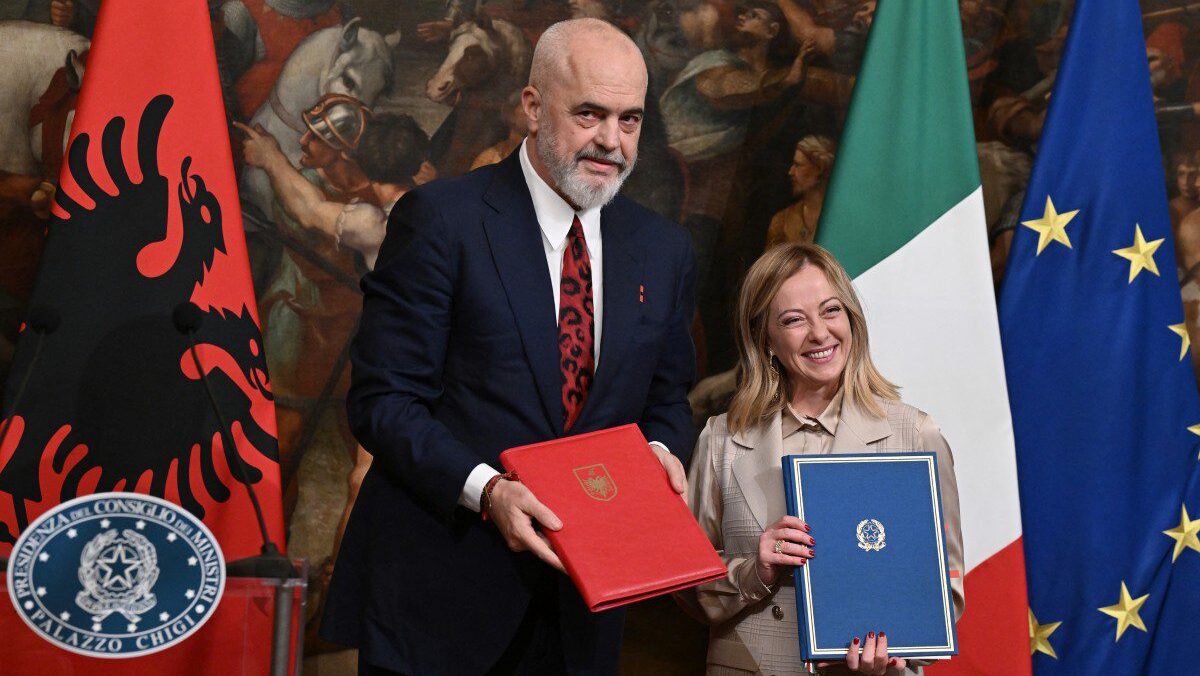
Albanian PM Edi Rama (left) and Italian PM Giorgia Meloni.
Photo: Tiziana Fabi / AFP
Albania’s Supreme Court has ruled in favor of the migrant deal between Italian prime minister Giorgia Meloni and her Albanian counterpart Edi Rama, giving the green light for a parliamentary vote in Tirana that is expected to pass without further problems.
The initial agreement between the two governments brokered in November envisioned the construction of two migrant reception facilities on Albanian soil. The facilities will be fully run by Italian personnel and allow authorities to process migrants’ asylum claims outside of Italy and the EU.
Under the agreement, the two facilities would hold 3,000 migrants at any given time, but only until their claims have been processed. A positive result would grant them entry to Italy while those with denied asylum claims are sent back to their home countries immediately.
Since the facility is outside of EU territory, allowing the Italian authorities to expedite border procedures more efficiently, Meloni expects to send up to 36,000 migrants to Albania every year.
Thirty Albanian opposition MPs attempted to block the ratification of the deal in December by referring it to the Supreme Court and challenging its constitutionality. On Monday, however, the head of the legal body publicly stated the deal was “in line with the Constitution [and] does not damage Albania’s territorial integrity.”
The ruling is seen as a defeat for the opposition not only in Tirana but also in Rome.
“Thus vanishes the last dream of the opposition that kept us nailed to our chairs in the Constitutional Affairs Committee, night and day, hoping that the agreement would not take shape,” conservative MP Riccardo De Corato said, describing the Italian Left’s fight against the agreement. “On the contrary, the Albanian court agrees with us, confirming that the Meloni government is on the right track.”
“The Cassandras of the Left, always ready to formulate portents of doom, will have to take a step back this time as well,” Sara Kelany, another MP from Meloni’s governing FdI added.
The agreement is expected to pass in the Albanian parliament without further problems, as Rama’s governing party holds 73 out of the 140 seats, but no date for the vote or the debate has been set yet.
Migrant-aiding NGOs have been also protesting the plan since day one, saying that the expected procedures and conditions inside the camp could easily violate EU law. For instance, migrants cannot usually be detained (kept inside a refugee center) while their claims are being processed in the EU, but in Albania, they can—as the plan’s legality was confirmed by Commission President von der Leyen, who even personally endorsed the proposal.
Italy has been facing a steadily increasing migratory push from across the Mediterranean, with over a million illegal arrivals registered in the past ten years, and over 155,000 in 2023. The figures are only projected to grow in the next couple of years, creating a challenge for Meloni’s Fratelli d’Italia which was elected on a strong anti-migration platform.
Since processing asylum claims can take weeks or even months, many of the migrants simply disappear into the country after being registered at one of the Italian reception centers—a phenomenon that the Albania deal aims to solve, at least partially.
While it is a major step toward easing Italy’s migration crisis, the 36,000 Meloni expects to send to Albania annually constitutes less than a quarter of the sea arrivals last year, which means the country needs to look for other solutions as well—like the ambitious “Mattei-plan” that seeks to boost up to dozens of African economies to curb migration.
